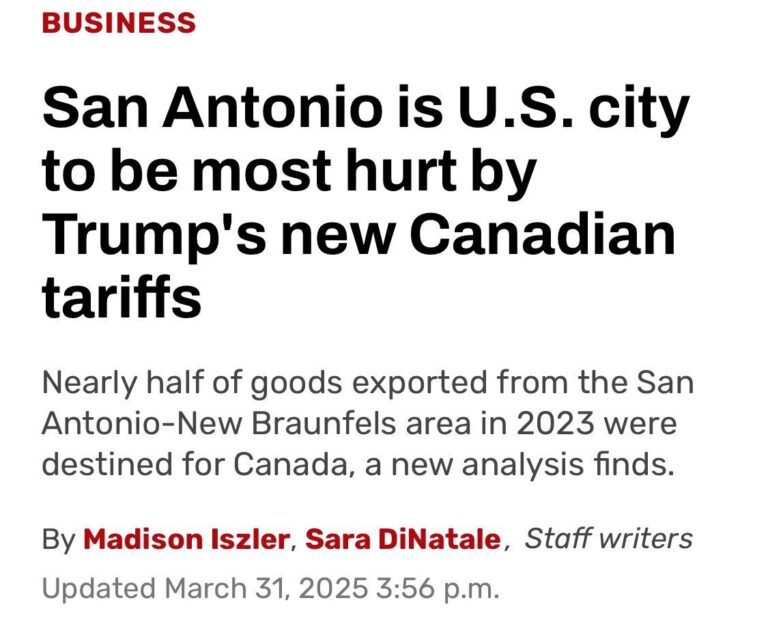Economic Challenges in San Antonio Amid Canadian Tariffs
San Antonio is currently grappling with significant economic pressures as Canadian tariffs continue to disrupt vital export channels. Key sectors such as manufacturing and agriculture have experienced a downturn in shipment volumes alongside rising operational costs due to these retaliatory trade barriers. Local entrepreneurs are increasingly concerned that these tariffs are fracturing long-standing supply networks, compelling businesses to either absorb escalating expenses or transfer them to consumers, potentially suppressing demand in an already delicate economic climate.
Industries most affected include:
- Automotive component manufacturing
- Food processing and agricultural exports
- Technology hardware suppliers
- Metal production, including steel and aluminum
| Industry | Projected Revenue Decline | Employment Impact |
|---|---|---|
| Manufacturing | $28M | 220 |
| Agriculture | $18M | 170 |
| Technology Supplies | $12M | 90 |
Major Industries in San Antonio Experiencing Tariff-Related Disruptions
Several pivotal sectors within San Antonio’s economy have been notably impacted by the imposition of Canadian tariffs. The manufacturing domain, particularly firms producing automotive and aerospace parts, has encountered increased costs and supply chain interruptions. These challenges have led to slowed export activity and heightened expenses, prompting some companies to postpone expansion plans or reconsider capital investments.
Additional affected sectors include:
- Agriculture: Producers of beef, citrus fruits, and other commodities face diminished access to Canadian markets.
- Technology: Companies dependent on cross-border electronic components are contending with tariff-induced price hikes.
- Energy: Oil and gas enterprises are indirectly affected as the cost of imported equipment rises.
| Sector | Challenges | Adaptive Measures |
|---|---|---|
| Manufacturing | Export delays, increased production costs | Supply chain restructuring, cost reduction initiatives |
| Agriculture | Restricted market access | Exploring alternative export destinations |
| Technology | Rising import tariffs | Shifting to local suppliers, adjusting pricing |
| Energy | Higher equipment expenses | Reevaluating project budgets and timelines |
Strategic Responses by San Antonio Businesses to Tariff Pressures
In response to the financial strain imposed by Canadian tariffs, many San Antonio enterprises are adopting new strategies to safeguard profitability. These include sourcing from alternative suppliers, renegotiating existing contracts, and revising pricing models to offset increased costs. Diversifying supply chains has emerged as a critical approach to minimize exposure to tariff-related disruptions.
Moreover, businesses are investing in advanced technologies and process optimizations to boost operational efficiency, enabling them to better absorb tariff-induced expenses. Common tactics among affected companies include:
- Prioritizing domestic procurement options
- Implementing just-in-time inventory systems
- Partnering with logistics firms to reduce shipping costs
- Enhancing product features to support price increases
| Approach | Objective | Industry Focus |
|---|---|---|
| Supplier Diversification | Mitigate tariff exposure | Manufacturing |
| Technology Upgrades | Improve efficiency and reduce costs | Retail |
| Price Recalibration | Preserve profit margins | Wholesale |
| Local Collaboration | Shorten supply chains and reduce costs | Food & Beverage |
Policy Recommendations to Support San Antonio’s Economy
Economic experts emphasize that San Antonio’s core industries, particularly manufacturing and agriculture, have been disproportionately affected by the escalation of Canadian tariffs. Without prompt and focused government assistance, these sectors risk losing competitiveness, which could trigger broader employment challenges across the region. Policymakers advocate for targeted relief measures, including tax incentives, export support programs, and infrastructure enhancements aimed at stabilizing the local economy and promoting sustainable growth.
Priority areas for intervention include:
- Financial aid for small and medium-sized exporters facing tariff-related cost increases
- Investment in advanced manufacturing technologies
- Trade diversification initiatives to reduce reliance on Canadian markets
- Workforce retraining programs to support displaced employees
| Sector | Estimated Economic Impact | Recommended Support Measures |
|---|---|---|
| Manufacturing | -$130M in export revenue | Tax relief and technology grants |
| Agriculture | 15-18% revenue decline | Export subsidies and market development |
| Logistics | Cross-border trade delays | Infrastructure investment |
Final Thoughts on San Antonio’s Trade Tariff Challenges
As Canadian tariffs continue to reverberate through San Antonio’s economy, the city emerges as one of the most impacted urban centers in the United States. This situation highlights the intricate ties between global trade policies and local economic health. Stakeholders remain vigilant, seeking solutions that can ease financial pressures and foster resilience. Moving forward, a collaborative approach involving policymakers, businesses, and community leaders will be essential to navigate these complexities and secure San Antonio’s economic future.




